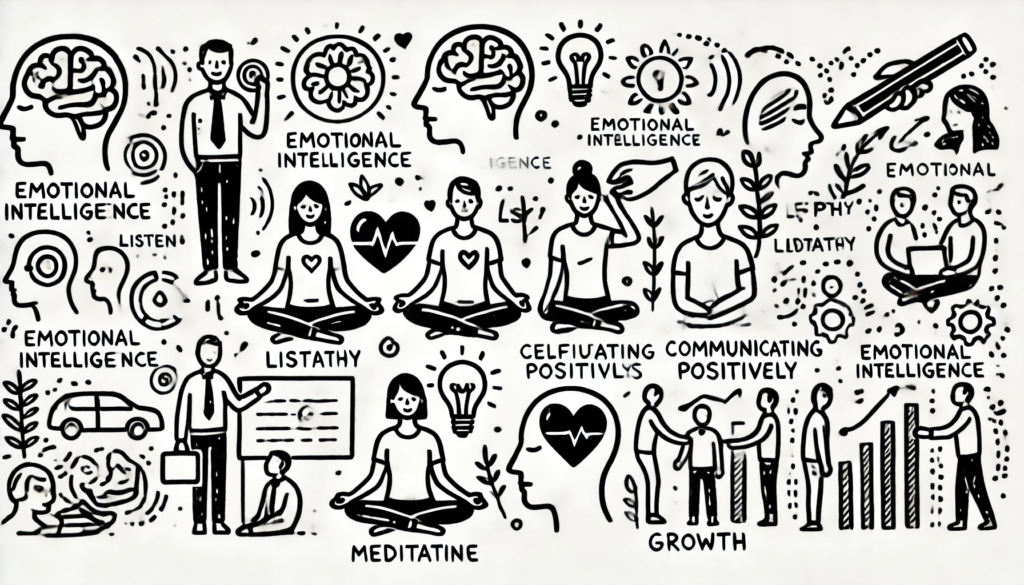
Emotional intelligence, or EQ, is the ability to recognize, understand, and manage our own emotions as well as the emotions of others. High EQ is linked to better relationships, greater success in personal and professional life, and overall well-being. In this blog, we’ll explore what emotional intelligence is, why it matters, and practical strategies to improve your EQ for better relationships and success.
Table of Contents
What is Emotional Intelligence?
Emotional intelligence is a set of skills that influence how we handle ourselves and our relationships. It includes the ability to:
- Recognize Emotions: Understanding your own emotions and those of others.
- Regulate Emotions: Managing and controlling your emotions in a healthy way.
- Use Emotions: Harnessing emotions to facilitate various cognitive activities like thinking and problem-solving.
- Empathize: Understanding the emotions of others and responding appropriately.
Why Emotional Intelligence Matters
High emotional intelligence can positively impact various areas of life, including:
- Better Relationships: Understanding and managing emotions helps in building and maintaining healthy relationships.
- Career Success: EQ contributes to skills like leadership, teamwork, and communication, which are crucial for career advancement.
- Improved Mental Health: High EQ can lead to lower levels of stress, anxiety, and depression.
- Enhanced Decision-Making: By being aware of your emotions, you can make more thoughtful and rational decisions.
5 Key Components of Emotional Intelligence
Emotional intelligence can be broken down into five main components, according to psychologist Daniel Goleman:
- Self-Awareness
- The ability to recognize your own emotions and how they affect your thoughts and behavior. Self-awareness allows you to understand your strengths and weaknesses and gain confidence in your abilities.
- Self-Regulation
- This involves managing your emotions in healthy ways, staying in control, and adapting to changing circumstances. Self-regulation helps you think before you act and maintain composure in stressful situations.
- Motivation
- Being driven to achieve for the sake of achievement. Emotionally intelligent people are motivated by internal goals, remain optimistic even when faced with challenges, and strive to improve.
- Empathy
- Empathy is the ability to understand the feelings of others and consider their perspectives. It allows you to respond to others’ emotions in a compassionate and appropriate manner.
- Social Skills
- This includes skills like communication, conflict management, and building rapport. Strong social skills help you connect with others, manage relationships effectively, and work well in team settings.
How to Improve Your Emotional Intelligence
Improving your EQ involves developing the key components of emotional intelligence. Here are practical strategies to enhance your EQ:
1. Practice Self-Awareness
- Keep a Journal: Writing about your thoughts and feelings can help you become more aware of your emotional responses.
- Reflect on Your Reactions: Take time to think about how you react in different situations and what triggers your emotional responses.
2. Manage Your Emotions
- Pause Before Reacting: Take a moment to breathe and think before responding to a situation, especially when emotions are running high.
- Practice Mindfulness: Mindfulness techniques, such as meditation and deep breathing, can help you stay grounded and manage your emotions more effectively.
3. Stay Motivated
- Set Personal Goals: Focus on setting and achieving personal goals that align with your values and passions.
- Celebrate Small Wins: Recognize and celebrate your achievements, no matter how small, to keep yourself motivated.
4. Enhance Your Empathy
- Listen Actively: Pay attention to what others are saying without interrupting, and show that you understand their perspective.
- Put Yourself in Others’ Shoes: Try to see situations from others’ viewpoints, which can deepen your understanding of their emotions.
5. Develop Strong Social Skills
- Improve Communication: Practice clear and effective communication. Be open to feedback and be willing to adjust your communication style.
- Resolve Conflicts Positively: Approach conflicts with a problem-solving mindset. Focus on finding mutually beneficial solutions rather than winning the argument.
Benefits of High Emotional Intelligence
Improving your emotional intelligence can lead to numerous benefits, including:
- Stronger Relationships: High EQ helps you connect with others on a deeper level, enhancing your personal and professional relationships.
- Better Stress Management: Emotionally intelligent individuals are better equipped to handle stress and cope with challenges.
- Increased Leadership Skills: EQ is a critical component of effective leadership, helping you inspire and guide others.
- Greater Success: High EQ can contribute to success in various areas of life, including career, personal development, and overall happiness.
Conclusion
Emotional intelligence is a powerful tool that can significantly impact your life. By improving your EQ, you can enhance your relationships, boost your career prospects, and achieve greater personal fulfilment. Start by practicing self-awareness, managing your emotions, staying motivated, and developing empathy and social skills. Remember, improving emotional intelligence is a journey, not a destination—embrace it and watch how it transforms your life.